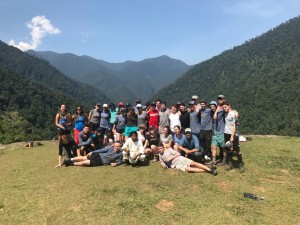 This March break, I, along with 31 of my peers, went on the Duke of Ed gold trip to Colombia where we built a house and went on a five-day hike to the lost city.
This March break, I, along with 31 of my peers, went on the Duke of Ed gold trip to Colombia where we built a house and went on a five-day hike to the lost city.
During the first two days after landing in Bogotá, we aided in the construction of a house in a borough of Bogotá called Soacha. We arrived at the building site early the first morning after a long bus ride from our hostel in Bogotá. After receiving instructions for the day, we began unloading the building materials from the truck and carrying them up a slope to the structure of the house we would be making. We worked quickly on the task and went on our lunch break. Before the workday and during the lunch break, my friends and I had time to get to know some of the people we were working with as well as the people we were helping by building this house. One of the young neighbourhood children, Philippe, came over to the work site to get a look at what we were up to. He got along very well with my classmates and me, and we all ended up dancing, laughing, and talking to him for the majority of our day. Sofia, Tomas, and Camila helped the rest of us by translating Philippe’s Spanish and our English so we could all communicate. Talking to Philippe allowed us to catch a glimpse of what it was like to live in a neighbourhood like Soacha, which has one of the highest concentrations of displaced people in the country due to the civil war between the government of Colombia and the FARC, the country’s largest rebel group. His childhood was, in fact, extremely similar to each of ours! He enjoyed playing sports, hanging out with his friends, and watching superhero movies. We were all very sad to leave by the end of the day, knowing that we would not be able to see Philippe again because he had his first soccer lesson the next day. We eventually said our goodbyes to our new friend and prepared for the long bus ride back to the city.
The following day, we arrived even earlier at the construction site and finally commenced building the house. Several people, including some university students from Bogotá not much older than us, helped our group with the construction project. Most of us did not know what to expect from the experience as we had never gone on a community service trip similar to this one, so we relied heavily on the help of these volunteers. They spoke to us primarily in Spanish, which ended up improving all of our vocabularies in the foreign language. One of the younger volunteers helped my friends and I speak to the two children who were living with the recipient of the house we were building. The two kids, José and Maya, were thrilled to introduce me to their other friends in their neighbourhood and loved taking pictures with the camera I had brought. At first, they were slightly nervous to talk to us, but after a while of speaking with the aid of the other volunteers, they both opened up! It was important to get to know the people that we were helping in order to find meaning and purpose in the project and have a connection to the community.
Both my group and the other group that was building a different house did not end up finishing due to weather constraints. As much as it was disappointing to not have given the completed house to its new owner, it felt good to know that we had made a difference in the lives of others. The community service project that took us just two days (almost) to complete resulted in a place for someone to call home. This experience was both inspiring and humbling, and I believe that those who participated in the Colombia trip this year would recommend it to anyone considering completing the Duke of Ed gold, or to those simply looking for the trip of a lifetime. – Stephanie Nofz ’18

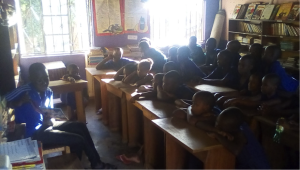 This past summer, I went to Uganda, a country in Africa that is about a 20-hour flight from Canada. While there, I volunteered at my grandmother’s school – Namutebi Nkata Nursery and Primary School – as part of my Duke of Edinburgh service hours.
This past summer, I went to Uganda, a country in Africa that is about a 20-hour flight from Canada. While there, I volunteered at my grandmother’s school – Namutebi Nkata Nursery and Primary School – as part of my Duke of Edinburgh service hours.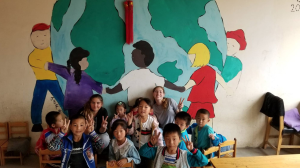 Last summer, I travelled to China on a trip organized by Me to We, a non-governmental organization which helps create sustainable change by transforming local and global communities. J’ai voyagé avec sept autres étudiants autour de mon âge venant de Montréal et New York, ainsi que deux animateurs de Me to We. From my past experiences at the Round Square conference in Argentina last year, as well as volunteering in the local community, I was always interested in community service. However, I can honestly tell you that this trip changed my life.
Last summer, I travelled to China on a trip organized by Me to We, a non-governmental organization which helps create sustainable change by transforming local and global communities. J’ai voyagé avec sept autres étudiants autour de mon âge venant de Montréal et New York, ainsi que deux animateurs de Me to We. From my past experiences at the Round Square conference in Argentina last year, as well as volunteering in the local community, I was always interested in community service. However, I can honestly tell you that this trip changed my life.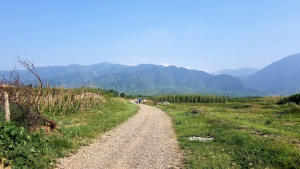 Nous avons passé nos premiers jours à Beijing en visitant des sites bien connus, tels que Tiananmen Square, des temples Buddistes, et nous avons même monté la Grande Muraille de Chine! Nous avons ensuite conduit pendant plus de six heures à une communauté rurale, Gufubao. It was a relief to finally be away from the pollution and smog of Beijing, and beautiful is not a good enough word to describe where we were. Nous étions complètement entourés d’énormes montagnes et des champs de maïs. It was really amazing for us to meet the kind locals, who take great pride in their natural environment, regardless of the extreme poverty that they live in. In addition, they always ensure that their environment is being taken care of, by being cautious of how much water and food they consume, as well as constantly making sure that their agriculture is properly cultivated and protected. Some locals even took us on hikes around the community, where we saw some unbelievable views.
Nous avons passé nos premiers jours à Beijing en visitant des sites bien connus, tels que Tiananmen Square, des temples Buddistes, et nous avons même monté la Grande Muraille de Chine! Nous avons ensuite conduit pendant plus de six heures à une communauté rurale, Gufubao. It was a relief to finally be away from the pollution and smog of Beijing, and beautiful is not a good enough word to describe where we were. Nous étions complètement entourés d’énormes montagnes et des champs de maïs. It was really amazing for us to meet the kind locals, who take great pride in their natural environment, regardless of the extreme poverty that they live in. In addition, they always ensure that their environment is being taken care of, by being cautious of how much water and food they consume, as well as constantly making sure that their agriculture is properly cultivated and protected. Some locals even took us on hikes around the community, where we saw some unbelievable views.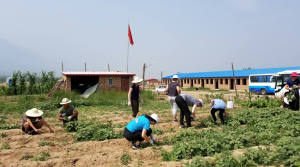 Pendant dix jours, nous avons enseigné l’anglais à des enfants défavorisés, et nous avons travaillé sur la construction d’un enclos pour des cochons, la première source de revenue pour la communauté. L’école était un bâtiment de briques avec trois salles de classe et un petit terrain de jeu dehors, les deux construits par Me to We. Lorsque nous sommes arrivés, nous avons été accueillis par une cinquantaine d’élèves, âgés entre cinq et 12 ans, qui étaient très contents de nous voir. Since it was July, all of these students were in the middle of their summer holiday, so you would think that going to school in 40 degree weather for the entire day was not exactly what they wanted to do, right? Wrong. These kids were more than happy to do so. Puisque les enfants parlaient très peu d’anglais, ils étaient très excités de nous montrer qu’ils pouvaient compter de un à 10, et qu’ils connaissaient les couleurs de l’arc-en-ciel.
Pendant dix jours, nous avons enseigné l’anglais à des enfants défavorisés, et nous avons travaillé sur la construction d’un enclos pour des cochons, la première source de revenue pour la communauté. L’école était un bâtiment de briques avec trois salles de classe et un petit terrain de jeu dehors, les deux construits par Me to We. Lorsque nous sommes arrivés, nous avons été accueillis par une cinquantaine d’élèves, âgés entre cinq et 12 ans, qui étaient très contents de nous voir. Since it was July, all of these students were in the middle of their summer holiday, so you would think that going to school in 40 degree weather for the entire day was not exactly what they wanted to do, right? Wrong. These kids were more than happy to do so. Puisque les enfants parlaient très peu d’anglais, ils étaient très excités de nous montrer qu’ils pouvaient compter de un à 10, et qu’ils connaissaient les couleurs de l’arc-en-ciel.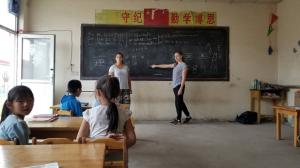 Why did I choose to write about teaching English to students in China? Well, we later learned that only 1% of students who have attended the school in Gufubao go on to university. That’s only seven or eight students at LCC progressing to CEGEP or college. Think about that for a second: all of the hard work that we put into our studies every day would only pay off for seven or eight of us in the Junior, Middle and Senior Schools combined!
Why did I choose to write about teaching English to students in China? Well, we later learned that only 1% of students who have attended the school in Gufubao go on to university. That’s only seven or eight students at LCC progressing to CEGEP or college. Think about that for a second: all of the hard work that we put into our studies every day would only pay off for seven or eight of us in the Junior, Middle and Senior Schools combined!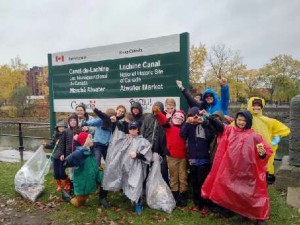 Malgré le froid et la pluie, nous étions 19 pour la 5e édition du grand nettoyage des berges du canal Lachine. Cette année, nous avons eu la joie d’avoir des élèves du Junior School.
Malgré le froid et la pluie, nous étions 19 pour la 5e édition du grand nettoyage des berges du canal Lachine. Cette année, nous avons eu la joie d’avoir des élèves du Junior School.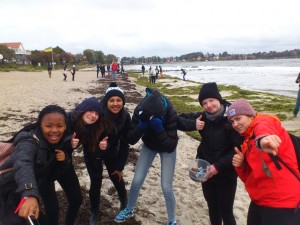 Wednesday was service day at the Round Square International Conference in Louisenlund. I was assigned to a larger group of ~60 delegates, all of whom would be participating in a cleanup of a local beach in the town of Eckernförde, just off the Baltic Sea. When we first arrived, I remarked to a friend that there really wasn’t much to clean: the beach looked spotless!
Wednesday was service day at the Round Square International Conference in Louisenlund. I was assigned to a larger group of ~60 delegates, all of whom would be participating in a cleanup of a local beach in the town of Eckernförde, just off the Baltic Sea. When we first arrived, I remarked to a friend that there really wasn’t much to clean: the beach looked spotless!